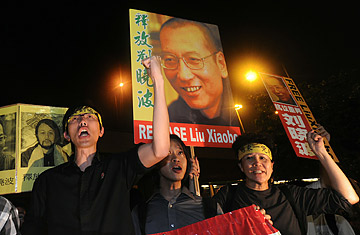
Protestors demonstrate to free Liu Xiaobo, who won the 2010 Nobel Peace Prize, near the China Liason Office in Hong Kong on October 8, 2010. Despite a warning to the Nobel committee and months of behind-the-scenes pressure, China failed to avert a harsh slap in the face — the awarding of the Peace Prize to jailed dissident Liu Xiaobo. Beijing predictably slammed the win for the 54-year-old Liu — the co-author of a bold manifesto calling for political reform who was jailed in December for 11 years for subversion, a sentence that won global condemnation.
(2 of 3)
In 1989, Liu cut short a stint at Columbia University to join the student protests in Tiananmen Square. Despite a reputation as an angry young man in Chinese scholarly circles, he quickly became a leading proponent of nonviolence. As the People's Liberation Army (PLA) began to move on the demonstrators on June 3, Liu tried to prevent bloodshed by negotiating with troops and urging protesters to evacuate Tiananmen Square. After the crackdown, he was attacked by both sides: the government sentenced Liu to 20 months in prison, while some democracy activists pilloried him for having deigned to talk to the PLA—even though his bargaining probably saved many lives. Unlike many other dissidents of that era, he chose to stay in China. Liu was sent to a labor camp in 1996, where he spent another three years for his continued criticism of the nation's closed political system. After two decades of surveillance, there was little Liu did that wasn't observed by police. His arrest on Dec. 8, 2008, came before Charter 08—which called for broad political reforms, including elections, a separation of powers and an independent judiciary—was even released.
After his arrest, most of Liu's supporters assumed that he would be sent back to jail for just a few years, as has happened to other high-profile activists during the party's most recent crackdown on its enemies. So when Liu was given an 11-year sentence last year, the longest prison term for dissidence Chinese legal observers could recall in recent years, his fans both inside and outside China were shocked. Paradoxically, however, the harsh sentence elevated Liu's stature internationally and was cited by the Nobel Committee as the reason he is now the leading symbol of China's human-rights shortcomings. "This is a self-inflicted wound," says Nicholas Bequelin, a Hong Kong—based researcher for Human Rights Watch. "The leadership [did something they had] managed for almost 20 years to avoid: having a figurehead for the democratic movement in China. Now, they have Liu Xiaobo as a uniting figure."
A Turning Point?
So what will happen now—to Liu, to other Chinese dissidents and within a newly challenged Chinese government? Though there were reports that Liu's prison guards had started giving him individually prepared meals instead of the standard jailhouse slop, harassment of Liu's activist brethren may increase in the short term. His wife Liu Xia and some of his friends were detained and put under house arrest in the hours following the Nobel announcement.
Nevertheless, the prize may end up being a turning point in modern Chinese history, the moment at which China's people—and a world that has looked on enviously at its stellar economic record—realize the flaw in its development model. "Today, with China showing such a strong economic performance, there still hasn't been any change to the political structure, and [the government] avoids any discussion or recognition of different ideas," says artist and human-rights advocate Ai Weiwei, who was beaten so severely by Chinese police last year that he had to undergo cranial surgery. "The Nobel sends a signal to the young generation, to people who don't know the history, to remind them that the world is still concerned about China and common values."
The equation used by the Chinese Communist Party is simple: economics trumps politics, prosperity precedes polls, social stability prevails over individual expression. Given China's unparalleled economic rise, it's easy to buy into the idea that a country can zoom into the future with one foot on an economic accelerator and another on a political brake. Haven't China's accomplishments—lifting hundreds of millions of people out of poverty, securing a spot as the world's second largest economy, hosting a magnificent 2008 Olympics—proved the success of its model? But the Nobel Committee rejected the idea that China's spectacular economic trajectory somehow gives the country a free pass to put activists in jail. "China's new status must entail increased responsibility," said Thorbjoern Jagland, the Nobel Committee chairman. "China is in breach of several international agreements to which it is a signatory, as well as of its own provisions concerning political rights."
